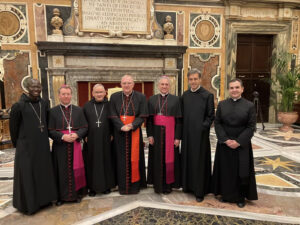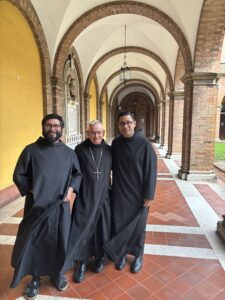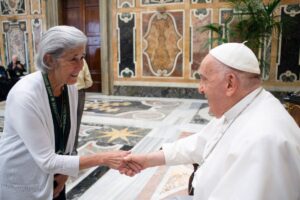Eulogy for Abbot Nathan Zodrow, OSB (1952–2025)
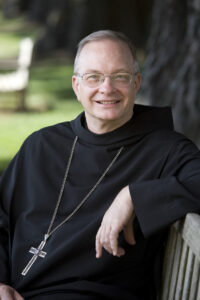 Abbot Jeremy, confreres, family and friends of Fr. Nathan, and the seminary community to which he was so devoted to over the years.
Abbot Jeremy, confreres, family and friends of Fr. Nathan, and the seminary community to which he was so devoted to over the years.
“For He wounds, but He also binds up; He strikes, but His hands heal.” (Job 5:18)
You will recall that on Gaudete Sunday last year, Abbot Jeremy, Br. Claude, and Fr. Nathan celebrated their Golden Jubilee of Monastic Profession. During the Eucharist, each renewed the vows of stability, obedience, and fidelity to the monastic way of life—vows they first made on September 8, 1974.
In reflecting on his life and vocation at that time, Fr. Nathan spoke of growing up in a devout Catholic household in eastern Washington, within the Diocese of Spokane. He shared how the example of his mother’s prayerful life and steadfast devotion to the Church, who along with the Dominican Sisters of St. Joseph, who staffed the local hospital, and the School Sisters of Notre Dame, who taught at the Catholic grade school, left a profound and lasting impression on him during his formative years.
After graduating from primary school, he enrolled in the diocesan high school seminary, Mater Cleri. It was there that he met Dan Lane, the future Br. Claude, and the two became close friends, united by their youthful spirit and shared love for the arts. Following their time at Mater Cleri, Fr. Nathan attended Gonzaga University for two years.
While at Gonzaga, the Jesuits invited several students to visit their Novitiate in Sheridan, Oregon. Fr. Nathan recalled that as the group was preparing to return to Spokane, several of the Jesuit novices suggested they stop at the Abbey on their way back. Fr. Nathan later reflected that it was almost by accident that he came to know of Mount Angel. We, however, know that in God’s designs, there are no accidents.
“For He wounds, but He also binds up; He strikes, but His hands heal.” (Job 18)
Looking back, Fr. Nathan recalled that as the car slowly wound its way up the main drive, he was captivated by the natural beauty: the towering old-growth timbers obscuring the sun, the lush green vegetation, the birds in flight, the squirrels darting about, the tall uncut wild grasses on either side of the road, the Stations of the Cross, the Grotto of the Virgin, the ordered pattern of the cemetery, and, finally, coming to the crown of the hill, the church and the surrounding red-tile roofed buildings. The beauty of the landscape, the valley below, the snow-capped peaks in the distance—the peace and presence of God, he said, was tangible.
At Vespers, he recalled being mesmerized by the monks in choir, their chant, and the graceful unity of their movements during the “Glory Be…” He spoke of that moment as one heavy with the palpable beauty of the divine presence. In the words of Pope Benedict XVI: “The encounter with beauty is a moment of truth. Through it, we come to know the ultimate beauty, which is God Himself.”
Fr. Nathan concluded his reflections, by saying, “In that instant, it felt as though I had found the answer to the course my life would take.”
“For He wounds, but He also binds up; He strikes, but His hands heal.” (Job 5:18)
In the slow ascent up the hill, Fr. Nathan’s attention would surely have been drawn to what lay directly ahead. Yet, his peripheral vision would have naturally caught glimpses of the Stations of the Cross to the right. Little could he have imagined that, in the years to come, as a monk, the manifold ways he would experience the weight of the Cross, and be propelled to tread the Via Dolorosa.
St. Gregory of Nyssa teaches, God, in His goodness, does not reveal the fullness of His divine plan all at once. He knows such a revelation would overwhelm us and would drive us away in fear. Instead, He unveils His will gradually, according to our capacity to bear it.
“For He wounds, but He also binds up; He strikes, but His hands heal.” (Job 5:18)
Following his ordination to the priesthood in the spring of 1988, Father Nathan was assigned several responsibilities within the monastery: Postulant Master, Socius to the Novice Master, and Master of Ceremonies. He also was elected to serve on the Senior Council. During this time, the Monastery Formation Council was established. He helped articulate protocols for accepting candidates, along with other formation policies.
For the next fifteen years, his assignments focused on the seminary apostolate. He served as the seminary’s public relations officer, as formation director, as vice-rector, and as seminary administrator during an interregnum between Rectors. Additionally, he took on the role of curator for the abbey’s art collection.
Father Nathan’s deep love for the seminary apostolate led him to see the need to strengthen the seminary’s identity, to foster a familial spirit among the faculty, and to enhance the academic and formation programs. His inspiration led to the establishment of the Lumen Gentium award in 1988, marking the hundredth anniversary of the Seminary’s founding. This recognizes those individuals who have made significant contributions to the Church’s pastoral mission and who have exemplified the calling of being a ‘Light for the Nations’ through their lives and work.
He also promoted the Seminary Annunciation Dinner, during which faculty and seminarians are recognized for their achievements over the year. In 2000, he reinstituted the seminary awards medal, which was originally established in the 1889-1890 school year but which had not been given for many years.
Later, as Abbot, he would establish the Seminary Benefit Dinner, which was held at the Convention Center in Portland, to support the seminary’s financial needs. This annual dinner became a major fundraiser for Mount Angel Seminary.
Father Nathan’s dedication to seminary formation was recognized in 2001 when he was invited by the Chair of the U.S. Bishops’ Committee on Priestly Formation to serve on the drafting committee for the fifth edition of the Program of Priestly Formation.
In the summer of 2001, the monastic community called upon him to serve as its tenth Abbot. As abbot, he led the community through a pivotal time. As the spiritual father of the community, motivated by his deep love of the monastic life he sought to guide the monks in achieving their professed purpose—seeking Christ above all.
Throughout all this, he continued his own education. In 2002, he was awarded a Doctorate in Educational Leadership from the University of Dayton. His thesis was titled, Four President Rectors of Mount Angel Seminary: A Story of Educational Leadership, 1972-1990.
As chief steward of the abbey’s temporal goods, he led the effort in 2002 to establish the Abbey Foundation of Oregon. The Foundation brought together individuals with professional expertise to oversee the management of the abbey’s temporal assets while fostering the community’s Benedictine mission in service to the Church in Western Oregon and beyond.
In his administration as Chancellor, he worked closely with the seminary administration and faculty, fostering a strong relationship between the seminary and the monastery to ensure the school was infused with the Benedictine charism. And he sought to strengthen the ties between the seminary and the dioceses associated with it. His efforts helped position Mount Angel Seminary as a recognized institution for priestly formation in the region. He also sought to ensure its governance and administration complied with the Code of Canon Law, the Program of Priestly Formation, and the agencies providing academic accreditation.
In this light, he established the Board of Directors in 2005. This board oversees the seminary’s mission, goals, programs, growth, and annual budget. At the same time, the Board of Members was established, with oversight responsibility for the seminary’s mission, its leadership, its financial assets, and the nomination of the President-Rector.
Abbot Nathan recognized the need to improve facilities for the seminary’s academic and spiritual programs. Under his guidance, the Annunciation building was completed in 2006.
He also oversaw the construction of “Tower of the Visitation” in 2007. This fulfilled a long-standing dream of the monastic community. The tower’s eight bells ring out over the hilltop.
Under Abbot Nathan, the monastery like the larger Catholic Church had to address issues related to past abuse of minors by abbey personnel. Having to address these matters early in his administration took a substantial psychological and physical toll on him. In compliance with ecclesiastical requirements, he established the Office of Child Protection and affiliated the abbey and seminary with Praesidium Inc., an external organization dedicated to promoting a safe environment for minors and vulnerable individuals.
After resigning from the office of abbot in 2009, Father Nathan was appointed pastor of St. Agatha’s Parish in Portland, where he served as a beloved pastor until 2018. Upon returning to the monastery, health challenges prevented him from engaging in active life within the monastic community. Nonetheless, he accepted several roles, including curator of the abbey’s art collection, the chair of the Arts and Environment Committee, the custodian of the abbey museum, and the abbey archivist.
His leadership and administrative burdens were now behind him. The instituting of new programs and initiatives were completed. The responsibility of planning renovations and new construction projects was over.
The ceaseless pressures that once defined his monastic life were no longer present. What was left in their wake was an unfamiliar quiet. What had once been a constant flurry of tasks and obligations gave way to an expanse of time—time that, though long awaited, now became a double-edged sword. The pace and activity of years gone by had perhaps masked the deeper reflections that time had long stored away.
Now, with distractions gone, he found himself confronting not only the accomplishments and blessings of his years, but perhaps also the deeper demands of the vow of conversatio morum. Now there was time to reflect upon the imperfections, the missed opportunities for change and growth, and the missteps that had been had left behind. As it is for anyone, age, poor health, and loneliness amplify the wounds that are left unaddressed. Time, once a friendly companion, now became a mirror—that reflected both the light and shadow of his journey, inclining him to ruminate on all that had been, and all that had not been.
Sometimes God wounds us by allowing us to come face to face with our interior wounds, so we may seek His help, rely on Him, ask for forgiveness for our sins, make reparation, and take responsibility for our actions. In this way, Father Nathan’s later years became a time of deep spiritual reckoning, where silence and stillness became an opportunity for God’s grace—a time to heal the wounds of the past, both seen and unseen.
“For He wounds, but He also binds up; He strikes, but His hands heal.” (Job 5:18)
Pope St. Gregory the Great in Moralia on Job, interprets the suffering of Job and applies it to the Christian understanding of suffering. In Book 5, Gregory reflects on the nature of divine discipline and healing. “The trials which the righteous endure are for their purification, not for their destruction. Though God allows suffering to befall His people, it is not because He delights in their afflictions, but because He wishes to lead them to greater strength, to heal their souls. Just as the physician must sometimes wound the body in order to bring about healing, so God allows the wounds of suffering to cleanse the soul and bring about great glory.”
In his apostolic letter, Salvifici Doloris, Pope St. John Paul II writes: “Christ’s suffering, in a sense, makes visible the whole mystery of human suffering. He, who is the Son of God, became man and took on our suffering. But He does not leave us in suffering, He does not abandon us in the depths of pain. By His wounds, we are healed, (cf. Isa 53:5). The divine ‘wounding’ is not without its purpose; it is a means of healing, an act of mercy and love. For the hand of God, and its providence, allows suffering for the purification of the soul, but always for the sake of restoration. He wounds, but He also binds up; He strikes, but His hands heal.”
Thus, the suffering of Christ is not just a part of the past; it is part of the present. In every moment of suffering that we endure, Christ is present. He gives meaning to that suffering by His own redemptive act. He heals us in our suffering, giving us the strength to bear it and allowing it to lead us toward our ultimate salvation.
This is the meaning of the text from Book of Job and its application to the life of our brother, Father, Abbot, Nathan Zodrow, “For He wounds, but He also binds up; He strikes, but His hands heal.” (Job 5:18)
As we entrust our beloved confrere, Father Nathan, to the loving mercy of God our Father, let us pray:
Lord our God, Artist Divine,
Creator of all — seen and unseen,
in Whom your divine artistry never wanes.
To You we commend Your servant, Father Nathan.
In your mercy, brush away the stain of his sins,
the sulliedness and disorder of imperfection.
Restore the beauty and grace in which You first fashioned his soul.
Open your heart to the crosses he bore in silence,
the trials endured,
the temptations waged,
the tears that fell, and the battles lost.
Bring forth the innocence of his baptism,
the self-offering of his monastic profession,
the image of Christ, the Eternal High Priest,
imprinted upon his soul at his ordination,
the good works and virtues that lie hidden,
and the care of souls he undertook as abbot.
May the very wounds of Christ Your Son,
in the light of the glory of His resurrection and ascension,
be the remedy for every defect, imperfection,
and need of your servant, Father Nathan.
In Your kindness, Lord, count him among the sheep of Your fold,
so that on Mount Zion, with jubilant heart,
he may gaze upon the beauty of Your face,
and You upon his,
in the company of the Blessed Virgin Mary,
the Joy of Monks,
our holy father St. Benedict,
and the choirs Angels and all Your Saints
forever and ever.
Grant this through Christ our Lord.
—Fr. Paul Thomas, OSB
Categories: Monastery, Uncategorized

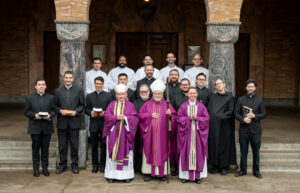 On March 11, 2025, 16 seminarians representing 7 (arch)dioceses and 2 religious communities were instituted as lectors and acolytes during the annual Ministries Mass at Mount Angel Seminary. Bishop Jaime Soto, bishop of the Diocese of Sacramento, was the principal celebrant and instituting prelate. Other concelebrants included Abbot Jeremy Driscoll, OSB, abbot and chancellor of Mount Angel Seminary, Fr. Jeff Eirvin, president-rector of Mount Angel Seminary, vocation directors and visiting priests, and priests from the monastery and the Seminary.
On March 11, 2025, 16 seminarians representing 7 (arch)dioceses and 2 religious communities were instituted as lectors and acolytes during the annual Ministries Mass at Mount Angel Seminary. Bishop Jaime Soto, bishop of the Diocese of Sacramento, was the principal celebrant and instituting prelate. Other concelebrants included Abbot Jeremy Driscoll, OSB, abbot and chancellor of Mount Angel Seminary, Fr. Jeff Eirvin, president-rector of Mount Angel Seminary, vocation directors and visiting priests, and priests from the monastery and the Seminary.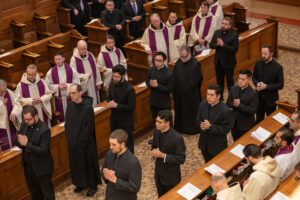 Following the homily, those seminarians receiving the ministry of lector were called forward by name. Bishop Soto prayed that “as they meditate constantly on your Word, they may grow in its wisdom and faithfully proclaim it to your people.”
Following the homily, those seminarians receiving the ministry of lector were called forward by name. Bishop Soto prayed that “as they meditate constantly on your Word, they may grow in its wisdom and faithfully proclaim it to your people.”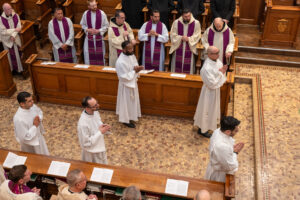 After the seminarians receiving the ministry of acolyte were called forward, Bishop Soto prayed that “they may be faithful in the service of your altar, and in giving to others the Bread of Life, may they grow always in faith and love and so build up your Church.”
After the seminarians receiving the ministry of acolyte were called forward, Bishop Soto prayed that “they may be faithful in the service of your altar, and in giving to others the Bread of Life, may they grow always in faith and love and so build up your Church.”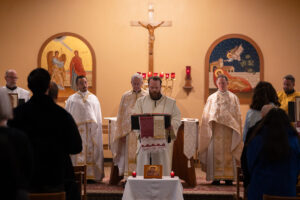 The Mount Angel Seminary community began the 2025 Week of Prayer for Christian Unity with a celebration of the Divine Liturgy of St. John Chrysostom in the Seminary’s St. Joseph Chapel. On January 18, the Seminary welcomed Father Richard Janowicz, pastor of Nativity of the Mother of God Ukrainian Catholic Church in Springfield, Oregon, to the Hilltop along with other Ukrainian Catholic clergy and lay faithful. Among the Ukrainian clergy who assisted in the liturgy was Father Deacon Justin Coyle, PhD, who serves on Mount Angel Seminary’s faculty as associate dean and professor of theology. Father Jeff Eirvin, president-rector of Mount Angel Seminary, concelebrated the liturgy along with Father Chi-Nhan Vo, a priest of the Archdiocese of Portland in Oregon and Mount Angel Seminary alumnus.
The Mount Angel Seminary community began the 2025 Week of Prayer for Christian Unity with a celebration of the Divine Liturgy of St. John Chrysostom in the Seminary’s St. Joseph Chapel. On January 18, the Seminary welcomed Father Richard Janowicz, pastor of Nativity of the Mother of God Ukrainian Catholic Church in Springfield, Oregon, to the Hilltop along with other Ukrainian Catholic clergy and lay faithful. Among the Ukrainian clergy who assisted in the liturgy was Father Deacon Justin Coyle, PhD, who serves on Mount Angel Seminary’s faculty as associate dean and professor of theology. Father Jeff Eirvin, president-rector of Mount Angel Seminary, concelebrated the liturgy along with Father Chi-Nhan Vo, a priest of the Archdiocese of Portland in Oregon and Mount Angel Seminary alumnus.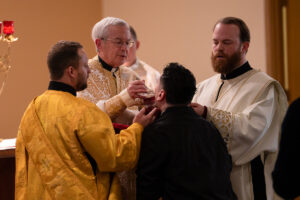 During the homily, Father Janowicz reflected on the beauty of the Church’s unity in the diversity of her rites and liturgies. For many, this was the first Divine Liturgy they had experienced, so Father Janowicz shared about some basic differences between the Latin Church and the Ukrainian Greek Catholic Church, such as the liturgical posture of standing throughout the Eucharistic prayer, the manner of receiving Holy Communion, symbols used during the Divine Liturgy, and the structure of the liturgical year.
During the homily, Father Janowicz reflected on the beauty of the Church’s unity in the diversity of her rites and liturgies. For many, this was the first Divine Liturgy they had experienced, so Father Janowicz shared about some basic differences between the Latin Church and the Ukrainian Greek Catholic Church, such as the liturgical posture of standing throughout the Eucharistic prayer, the manner of receiving Holy Communion, symbols used during the Divine Liturgy, and the structure of the liturgical year.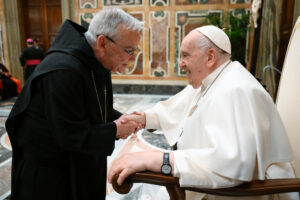 On January 11, the Holy Father Pope Francis announced the appointment of Abbot Jeremy Driscoll, OSB, as a member of the Dicastery for Divine Worship and the Discipline of the Sacraments for a period of five years. The main responsibility of the dicastery is the promotion of the sacred liturgy according to the liturgical renewal of the Second Vatican Council and advising the Holy Father on liturgical matters.
On January 11, the Holy Father Pope Francis announced the appointment of Abbot Jeremy Driscoll, OSB, as a member of the Dicastery for Divine Worship and the Discipline of the Sacraments for a period of five years. The main responsibility of the dicastery is the promotion of the sacred liturgy according to the liturgical renewal of the Second Vatican Council and advising the Holy Father on liturgical matters.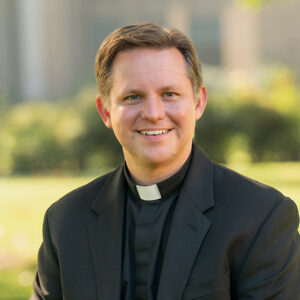 On August 26, during the opening Mass of the academic year at Mount Angel Seminary, Fr. Jeff Eirvin was installed as the Seminary’s 10th president-rector by Abbot Jeremy Driscoll, abbot and chancellor of Mount Angel Abbey and Seminary. Fr. Eirvin, a priest of the Archdiocese of Portland in Oregon and an alumnus of Mount Angel, said, “I’m very excited to lead this flock of seminarians, now entrusted to my care, into deeper communion with Jesus Christ, the Eternal High Priest, whose image and likeness they will be configured to on the day of their ordination.”
On August 26, during the opening Mass of the academic year at Mount Angel Seminary, Fr. Jeff Eirvin was installed as the Seminary’s 10th president-rector by Abbot Jeremy Driscoll, abbot and chancellor of Mount Angel Abbey and Seminary. Fr. Eirvin, a priest of the Archdiocese of Portland in Oregon and an alumnus of Mount Angel, said, “I’m very excited to lead this flock of seminarians, now entrusted to my care, into deeper communion with Jesus Christ, the Eternal High Priest, whose image and likeness they will be configured to on the day of their ordination.”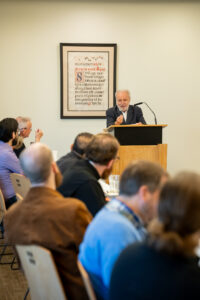 The gathering of more than 20 scholars was unique for many of those participating in the discussions due in part to the presence of Msgr. Piero Coda, full professor at Sophia University Institute in Italy and Secretary-General of the International Theological Commission. Using Msgr. Coda’s method of “doing” theology as a respectful dialogue with an openness to the Holy Spirit, the discussions focused on Msgr. Coda’s teachings on Trinitarian Ontology. All of this may sound intimidating, but Msgr. Coda’s method is simply a way of doing theology that invites the participants to be open to the promptings of the Holy Spirit as they present their views and listen to one another. In this spirit of openness and receptivity to the other,
The gathering of more than 20 scholars was unique for many of those participating in the discussions due in part to the presence of Msgr. Piero Coda, full professor at Sophia University Institute in Italy and Secretary-General of the International Theological Commission. Using Msgr. Coda’s method of “doing” theology as a respectful dialogue with an openness to the Holy Spirit, the discussions focused on Msgr. Coda’s teachings on Trinitarian Ontology. All of this may sound intimidating, but Msgr. Coda’s method is simply a way of doing theology that invites the participants to be open to the promptings of the Holy Spirit as they present their views and listen to one another. In this spirit of openness and receptivity to the other,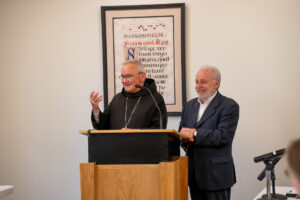 a rich dialogue can emerge, which many participants felt was a key difference from other academic conferences they had attended. The conference at Mount Angel was also important in bringing the thought of Msgr. Coda to the English-speaking world of theology, where he is still largely unknown.
a rich dialogue can emerge, which many participants felt was a key difference from other academic conferences they had attended. The conference at Mount Angel was also important in bringing the thought of Msgr. Coda to the English-speaking world of theology, where he is still largely unknown.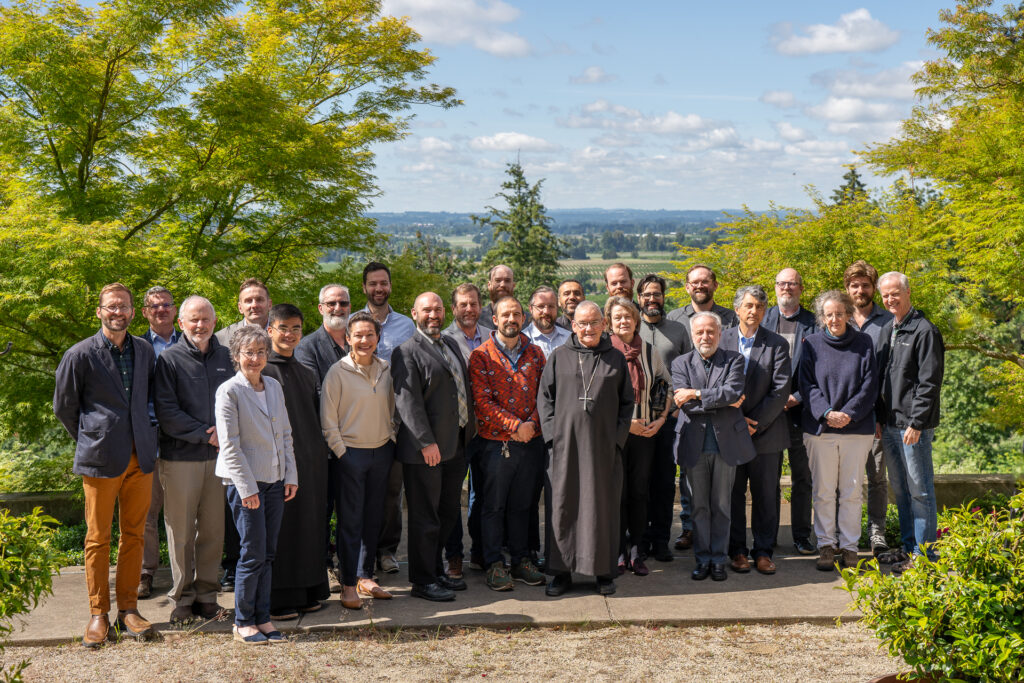 Br. Anselm Flores, OSB, coordinator of the Mount Angel Institute, worked with de los Reyes and other Mount Angel Seminary faculty members in planning and hosting the event. In his own words: “I had thought that I would be the one benefiting most from listening to some of the conversation around the table. After all, these scholars were the very authors I was reading in seminary! But I realized that they were also benefiting from us, from the space we offered, from monks, and even from me. I was humbled that some of my heroes looked up to the monks, and I felt proud and happy of my vocation. At the same time, I felt the responsibility. God has given Mount Angel a gift and charism. The Fellowship of Scholars was a brief and strong epiphany of our vocation as a monastery.”
Br. Anselm Flores, OSB, coordinator of the Mount Angel Institute, worked with de los Reyes and other Mount Angel Seminary faculty members in planning and hosting the event. In his own words: “I had thought that I would be the one benefiting most from listening to some of the conversation around the table. After all, these scholars were the very authors I was reading in seminary! But I realized that they were also benefiting from us, from the space we offered, from monks, and even from me. I was humbled that some of my heroes looked up to the monks, and I felt proud and happy of my vocation. At the same time, I felt the responsibility. God has given Mount Angel a gift and charism. The Fellowship of Scholars was a brief and strong epiphany of our vocation as a monastery.”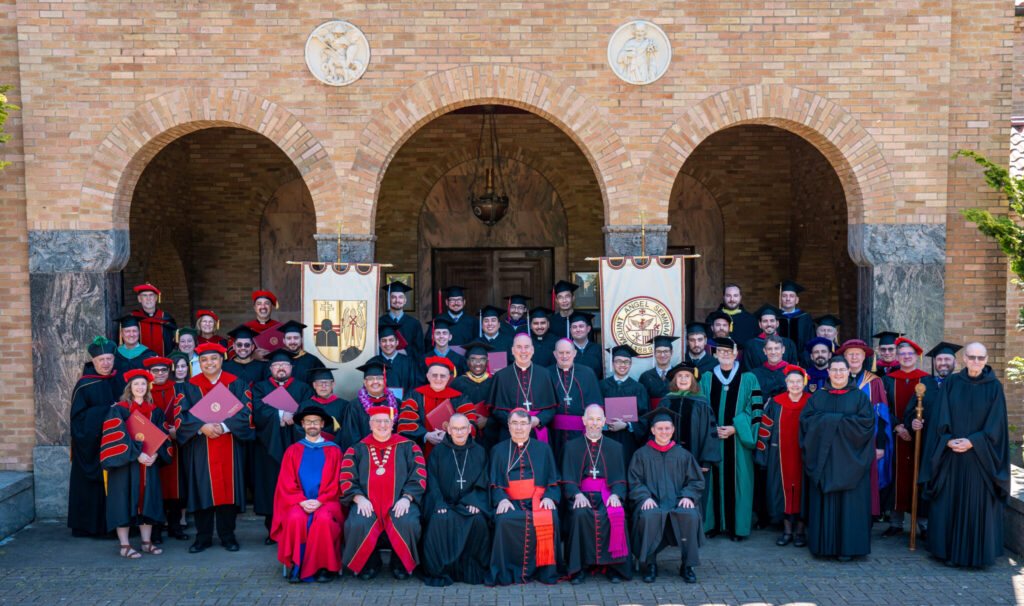 His Eminence Christophe Cardinal Pierre, Apostolic Nuncio to the US (center, first row), joined Mount Angel Seminary’ 135th graduation ceremonies, May 11, 2024. The presence of His Eminence Christophe Cardinal Pierre at this year’s Baccalaureate Mass and Commencement Exercises elevated the celebrations in a unique way.
His Eminence Christophe Cardinal Pierre, Apostolic Nuncio to the US (center, first row), joined Mount Angel Seminary’ 135th graduation ceremonies, May 11, 2024. The presence of His Eminence Christophe Cardinal Pierre at this year’s Baccalaureate Mass and Commencement Exercises elevated the celebrations in a unique way.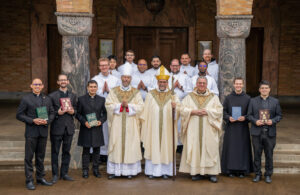 Five seminarians from Mount Angel received the ministry of lector and nine seminarians received the ministry of acolyte on March 22, in the church of Mount Angel Abbey. Bishop Jeffrey M. Fleming, of the Diocese of Great Falls-Billings, installed the lectors and acolytes. Bishop Fleming is a graduate of Mount Angel Seminary, having received his master’s degree in theology in 1992. During the homily, Bishop Fleming encouraged the seminarians to hear how the Lord is calling them through these ministries of lector and acolyte. “God is calling you by name. God has chosen you. Will you allow God to call you to new ministry, to new life?” asked Bishop Fleming.
Five seminarians from Mount Angel received the ministry of lector and nine seminarians received the ministry of acolyte on March 22, in the church of Mount Angel Abbey. Bishop Jeffrey M. Fleming, of the Diocese of Great Falls-Billings, installed the lectors and acolytes. Bishop Fleming is a graduate of Mount Angel Seminary, having received his master’s degree in theology in 1992. During the homily, Bishop Fleming encouraged the seminarians to hear how the Lord is calling them through these ministries of lector and acolyte. “God is calling you by name. God has chosen you. Will you allow God to call you to new ministry, to new life?” asked Bishop Fleming.